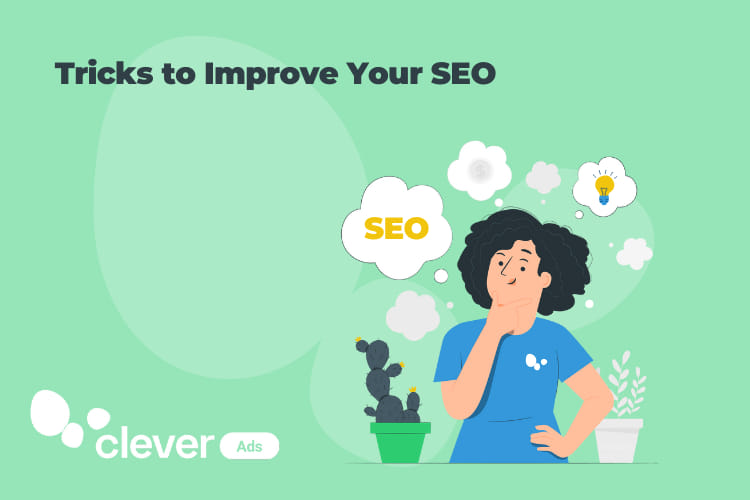How to improve your SEO: tricks and tips!
Improve your SEO!
When building an eCommerce, SEO (Search engine optimization) is one of the most important things that you should work on and improve. If you have a good SEO strategy Google will rank your page better for organic searches; this means that you will get tons of free qualified traffic and drastically increase your sales! But keep in mind that SEO actions require time to start working and getting results; this is why many people don’t use it, thus losing opportunities of driving traffic to their sites and losing potential sales.
In this post, we are showing you some really useful tricks and tips to improve the SEO of your site drastically. Let’s begin!
Find the best keywords for your SEO strategy
Keywords are one the essential parts when building a good SEO strategy. This is the same as when you are researching keywords for Google Ads, but how can we find the keywords that we want to use for our site’s SEO? There are different programs that will help you with this:
- Ubersuggest from Neil Patel: This is an amazing page that will help you find a lot of keywords for your website. Start by entering a general keyword of your website and it will analyze the search volume, the SEO difficulty, the paid difficulty and the CPC (cost per click). It will also show you the related keywords that you could rank for! As you can see, it is a really useful tool that every eCommerce owner should know about.
- Kwfinder: This is another page with similar functionalities with Ubersuggest. You have to register in order to use their software and if you don’t pay you will have limited access, but the free version also works really well!

- SEMRush: This is a very useful tool for analyzing keywords from competitors in order to see what are they doing. Use this to investigate what they do to rank for the first position and decide how to enact a keyword strategy similar to theirs.
- Keywords everywhere: This is a chrome extension that will analyze the keywords of a page. It will show you which keywords they are ranking for and their density (the amount of times that the keyword is appearing).
- SEO Quake: This tool will help by checking the backlink strategy of the page you want to analyze. It will not only show the internal links but also the external links that the page has.
The process of choosing the keywords to rank for should always check:
- The relevance of the selected keywords for your page.
- Keywords volume stats; you have to check the CPC (cost per click) and the number of searches of that keyword.
- Benefits for trying to rank for that keyword.
- Google Trends for how trendy that keyword is and try to predict the changes.
- Seasonality keywords. For example: If we search for electric guitars on Google Trends, we can see that the highest number of searches comes when Christmas is near.
- Long tail keywords because once you have ranked for them, they often bring a lot of conversions and relevant traffic.
Improve your website’s SEO (SEO on Page)
Keep in mind that you have to work with the design of your website to make it SEO friendly. It is important for you to use these tips that we are going to show you from the beginning, otherwise you will have to make a lot of changes in the future that will waste a lot of time. Let’s see the main tips to have a healthy SEO on page:
- If you have not created your website yet, try buying a domain with the main keyword on the URL. For example, if we are creating an eCommerce that sells cat collars, a perfect domain would be catcollars.com. This will help you a lot to rank for the first pages of Google.
- When doing a backlinking strategy, try to get links to your website from other websites with domains like .org, .edu or .gov. These pages are great for backlinking because they often have a lot of domain authority. Don’t forget to check that the links you are building with other pages are “Do Follow” links, otherwise it won’t help your page’s authority.
- Edit your URLs and make them SEO friendly, always try to have in your URLs the keyword that you are trying to rank for.
- For example, if we are trying to rank a blogpost for the keyword “cat collars”, a perfect URL would be: catcollars.com/blog/top-5-best-cat-collars
- The words of the URL should be separated by using dashes, just as the example above.
- Don’t use special characters such as “&”, “*”, “ç…”
- Don’t use stopwords such as: “of”, “on”, “in…”
- The URLs should always be in underscores.
- Pay special attention when you are building you snippets, specially with the “Tittle Tags” and “Meta description tags”. Try always to put your main keyword in:
- <Title>
- <URL>
- <Meta description>
- <Slug> (The visible URL)
- Use the Headings! (Commonly known as H1, H2, H3) Google gives special importance to Heading1 (H1) and Heading2 (H2) so always try to put your keywords in these headings. Also please keep a good structure when building the page, for example don’t use a H1 if you have already used a H2, a good organization is super important for SEO!
How to study your competitor’s SEO strategy and learn how to improve your SEO
You should always investigate and analyze your competitor’s SEO strategy; try to figure out what are they doing to achieve the first positions of Google. Let’s see what you have to do if you want to investigate them:
- Search for your keyword on Google and look at the top 3 organic results.
- Activate the extension that we have mentioned above “Keywords Everywhere” and check the number of characters for the 3 pages. Make an average between the 3 pages and you will know how many characters your page should have if you want to rank for the first page.
- Do the same thing for the keyword, check how often they repeat the keyword on their pages (this is the keyword density). Then you will know how many times your keyword should appear during the text of the page.
- Check where they put those keywords, maybe in the title, the H1 or H2…
As you can see, SEO is easy to understand but it can be tedious and time-consuming. However, you should be constantly improving it because it will bring you a lot of benefits. Make Google understand that your eCommerce is important and relevant for certain keywords! If you need more info, here you have the ultimate paid search and seo guide for eCommerce. And… Are you acquainted with the PMAX campaigns conducted by Google and Microsoft? They’re definitely worth checking out!




